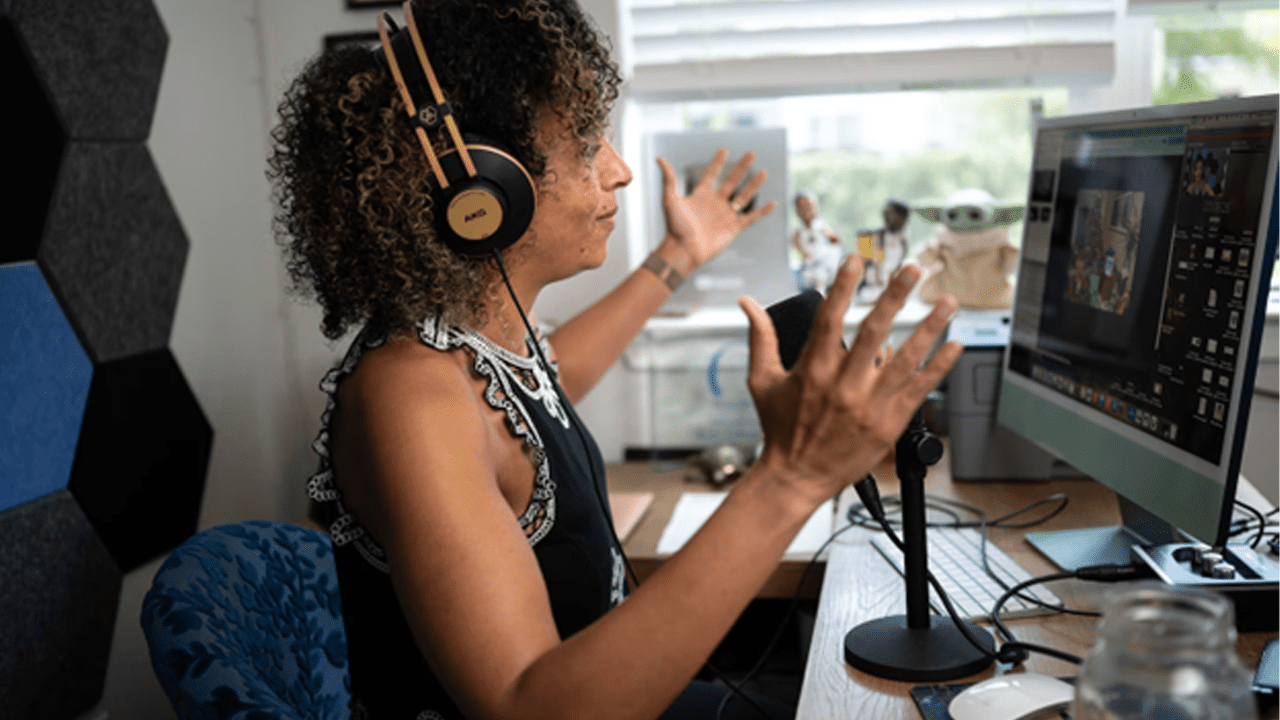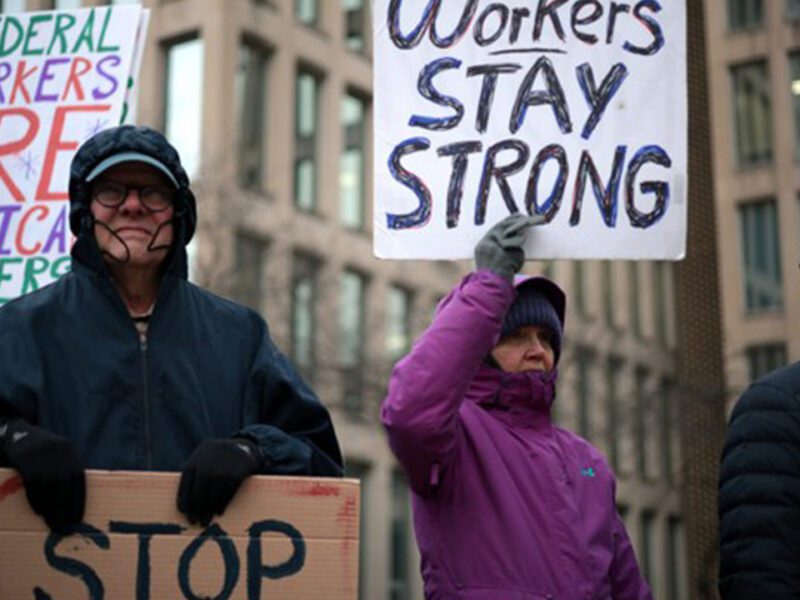
They quit liberal public schools. Now they teach kids to be anti-‘woke.’
The Washington Post | By Hannah Natanson | April 15, 2024
SOUTHWEST FLORIDA — Kali Fontanilla repeated the lesson title to herself one last time — “‘A Com-plete History of Slavery in America’” — sipped her peppermint tea and hit record.
“Hello, Exodus students,” she said, addressing the group of 90 fifth- through 12th-graders who would eventually watch the video as part of their lessons from the Exodus Institute, an online Christian K-12 school Kali and her husband founded in 2021 with the motto “Exit Public Education.” The video, which Kali was recording in her guest bedroom-turned-office, was the latest in a special enrichment program dubbed the “Young Patriots Academy,” which aims to “debunk the ‘woke’ lies taught in most public schools,” per the Exodus website.
Kali, who is half Black and half White, had a particular target that Friday: what she calls the left’s unquestioning advocacy of reparations, the theory that the government should pay restitution to descendants of enslaved Americans.
She told her virtual class they were about to learn of the Quakers, and how White members of that religion helped fight slavery. She said that, throughout American history, there were good people and bad people. But focusing only on the bad, like she believes many public school teachers do, would be wrong.
“Whenever you learn history,” she said, “it’s important to learn the full context of it.”
Kali’s online job marked a sharp departure from the years she and her husband, Joshua Fontanilla, spent teaching middle- and high school English in California’s deep-blue Salinas district. The couple quit their jobs a year after the coronavirus pandemic began, disillusioned by school shutdowns and displeased by some colleagues’ embrace of the Black Lives Matter movement, which both thought was wrongheaded and hateful for what they saw as its anti-police stance.
Kali, 41, and Joshua, who is 42 and of Mexican and Puerto Rican descent, had also grown convinced their school was teaching harmful ideas about race and history, including what they believe is the false theory America is systemically racist. Across the nation, mostly conservative mothers and fathers were raising similar alarms — anxiety that soon fueled an explosion of legislation restricting how educators can teach about race, sex and gender.
By April 2024, such laws had spread to affect half the nation’s students. The claim that public schools teach left-wing “indoctrination, not education” had become a commonplace on the right, repeated by parents, politicians and pundits.
But not, usually, by teachers. And that’s why the Fontanillas felt compelled to act: They came direct from the classroom. They had seen firsthand what was happening. Now, they wanted to expose the propaganda they felt had infiltrated public schools — and offer families an alternative.
In 2021, eager to fulfill their mission, the couple moved to Florida to found their own Christian school in a state which, under Gov. Ron DeSantis (R), had become a haven for people with views like theirs. In the years since, they have grown their school to nearly 200 students, partly through Kali’s appearances on conservative media like Fox News — but mostly through her social media.
Kali’s Instagram videos, filled with right-wing rhetoric and delivered almost daily to her 333,000 followers, proved a powerful recruiting tool. But they also spurred thousands of critical messages from online observers who contended she was indoctrinating students into a skewed, conservative worldview. “RACIST, ONE SIDED, WHITEWASHED OPINION,” one wrote on a recent post, just above someone else who declared: “No one [is] impressed by the trash you are trying to sell.”
Now, half an hour into her lesson on slavery, Kali told students how some Quakers risked prison time to assist people fleeing enslavement.
“There are certain people that are saying, ‘oh, White people owe Black people for slavery,’” Kali said. “But what about the White people who were descendants of the Quakers, who actually had a lot of negative consequences that happened to them for helping free the slaves?”
She urged her students to keep pondering the question as they turned to their next assignment.
Kali was a few years into studyingfor her master’s degree in education at the University of California at Santa Cruz when, she recalled, a professor told her class to take a “privilege walk.”
He formed the students into a line, Kali said, and asked a series of questions: Have you ever seen a play? What about a concert? Students stepped forward if the answer was “yes,” backward if the answer was “no.”
Kali hated it. Although she came from a challenging background — her Jamaican father left her White mother early on, she said, and the family was always strapped for money — she wound up standing ahead of wealthier White classmates because her grandmother had insisted she be exposed to the arts. And she couldn’t believe the professor didn’t ask about sexual abuse. “Even if you are the richest young person, White, whatever, if you’ve been sexually abused, that’s the worst trauma you could ever receive,” Kali said.
A spokesman for UC Santa Cruz confirmed Kali attended the school, but said he could not “easily verify anything beyond that.”
Years later, teaching English in Salinas, she was horrified when she saw other teachers giving students a “privilege quiz” during a ninth-grade ethnic studies class. (Gov. Gavin Newsom (D) signed a law making ethnic studies a statewide requirement about a year later.) Curious and worried, Kali looked up the ethnic studies lesson plans in the school’s internal systems and found evidence some colleagues were using the class to introduce students to “critical race theory,” a college-level academic framework that holds racism is baked into American institutions. Kali had encountered the theory in graduate school — and loathed it, fearing it would convert students into victims who lay blame on racist systems rather than accept any individual responsibility.
In the ethnic studies class, teachers were urging students to study school policies “through a Critical Race Theory framework,” according to screenshots of a presentation that Kali shared with The Washington Post, meaning they should analyze how “race affects our experiences.” Students were told to take three “Steps Against Hegemony,” per the power point: “Analyze ‘hidden curriculum.’” “Use Critical Race Theory.” “Be active participants.”
Asked about the ethnic studies course, district officials wrote in a statement that “embedded in the lesson outcomes was the question for students to analyze whether or not race may be viewed as a contributor to one’s experiences.” The district surveyed students who completed the class in 2022, officials wrote, and their “feedback was overwhelmingly positive.”
Around the same time, Joshua Fontanilla said he was also spotting what he perceived as bias at school. His suspicions stirred, he said, when he noticed his high school always announced meetings of the Gay-Straight Alliance club over the loud speakers — but not those of other clubs, like his chess group.
Joshua then began combing through the “American Dream” unit of the English curriculum, researching the politics of every author. He concluded that too many (at least 12 of 19) were “left-leaning,” including — as Joshua saw it — “leftist” historian Studs Terkel, “socialist” poet Langston Hughes and “Dem” Walt Whitman.
District officials wrote in a statement that “there is no evidence nor complaint ever brought forward regarding inequity in clubs being recognized during the announcements” and noted that the English curriculum conforms to California state standards. Officials added that the Fontanillas never “made a complaint formally or informally to any district official.”
A decade ago, Kali and Joshua said, they would have agreed with what their school was teaching. Both were raised in a blue slice of California by what they described as liberal families, and for a long time accepted those views without question.
When Sira Taylor hired Kali to tutor her son in 2012, Kali was “definitely left-leaning in her politics,” Taylor recalled. But Taylor, a Santa Cruz-area mother of two and self-professed independent, didn’t care: She just knew Kali was good for her son, who was struggling to read and focus. Under Kali’s tutelage, Taylor said, the boy’s reading skills and academic performance soared. She still remembers how Kali let him run around the block whenever he got antsy.
“She just really got the fact he was a young little boy who had a lot of energy,” Taylor said. “He’s a sophomore in college and an amazing student now, and he wouldn’t be without her.”
By the time Kali finished tutoring Taylor’s son, she and Joshua had begun to reconsider their Democratic allegiances.
Kali grew disillusioned with President Barack Obama when he signed a 2014 law cutting $8.7 billion in food stamps — a benefit that she, her mother and two siblings relied on throughout her childhood, she said. Joshua came to realize he agreed with many of President Donald Trump’s policies, including his hard line stance on immigration.
And both were disgusted with liberal politicians’ response to the pandemic, especially their willingness to shut down schools, which Kali and Josh believed should have been last to close. The couple’s concern over curricula, most notably the ethnic studies class, was the final straw.
In summer 2021, her mind made up, Kali wrote a letter to the school board.
“If the district continues to move forward with all these divisive teachings, it will only harden the hearts of many of our students,” she wrote in the letter, which the superintendent read aloud at a June board meeting after she submitted it for public comment. “I have decided to resign from the district, which is the only reason I feel brave enough to speak out without fear of repercussions.”
At the board meeting following the letter-reading, several students gave speeches in favor of the ethnic studies course that helped prompt Kali’s resignation. “I would like to be able to learn my people’s history at schools,” said one student, noting she is of Mexican and Latina heritage.
“I feel like ethnic studies unites us more because we have a new understanding,” another student told a local reporter. It “makes us understand why certain stereotypes are in our communities and how to fix them.”
But Kali wasn’t there to hear them. Before that summer ended, she and Joshua packed their bags, put their chihuahua in a travel crate and headed for the Sunshine State.









